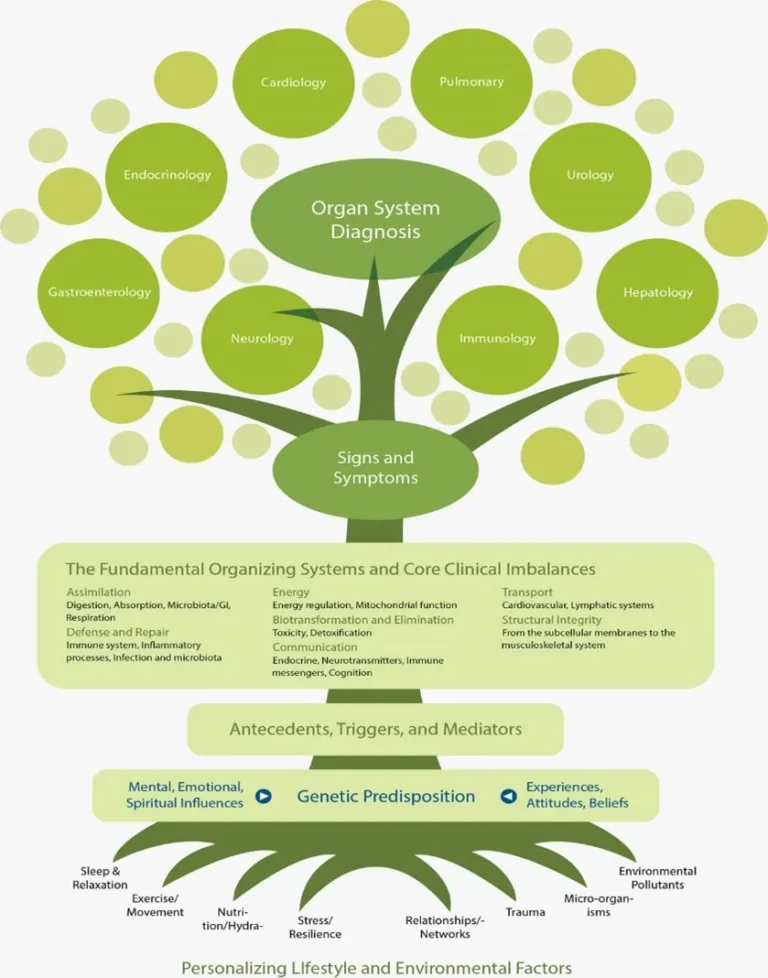Functional Medicine: Getting to the Root of the Matter
Navigating the complexities of a chronic condition can be labyrinthian—with patients facing an overwhelming number of complicated and confusing pathways from diagnosis to resolution. For many years, patients relied on the charted territory of conventional medicine. Diagnoses were made and treatments prescribed based upon observable symptoms—the subjective evidence of disease (e.g., pain, fatigue). Simply put, conventional medicine diagnosed and treated what was at the surface. Practitioners treated a patient’s symptoms rather than the cause of those symptoms.
Today, patients are increasingly turning to the biology-based, scientific approach of Functional Medicine. This wholistic field of medicine ventures below the surface to determine a chronic condition’s root cause—the origin from which symptoms stem. To do this, Functional Medicine practitioners endeavor to determine the why behind every condition: Why is the patient ill? Why is the patient experiencing this chronic condition? By determining the why, Functional Medicine providers can identify and treat chronic conditions at their sources—rather than simply suppressing symptoms.
Tree of Health
In Functional Medicine, the structure of a tree visually captures the main components of the field’s paradigm—with both the health of a tree and the health of a patient dependent upon foundational factors. To thrive, the most basic, essential elements—the tree’s roots and soil—must be supported. Similarly, when disease is detected and the tree’s health is compromised, the first place to seek answers is within the tree’s foundation. This approach is analogous to the approach Functional Medicine providers take to patient health. Signs and symptoms of disease stem from causes rooted in a patient’s foundational factors: environment, genetics, and lifestyle.

The figurative roots and soil of patient health comprise sleep, exercise, nutrition, trauma, stress, relationships, and environmental pollutants.
These foundational factors are influenced by antecedents (factors—genetic or acquired—that predispose a patient to illness); triggers (factors that provoke symptoms and signs of illness); and mediators (factors—biochemical or psychosocial—that impact dysfunctional responses)—which may result in fundamental imbalances (represented by the tree’s trunk). These imbalances then manifest themselves in signs and symptoms that are grouped into diagnosable sets (represented by the tree’s branches and leaves) that we know as disease.
While Functional Medicine investigates the figurative soil and roots, conventional medicine typically focuses on the constellation of symptoms associated with disease diagnosis, and prescribes treatments to address these symptoms. Here, the conventional patient’s journey from diagnosis to presumed resolution ends—without the underlying cause identified and addressed.
Laying the Groundwork
When providers routinely address root cause—rather than symptoms—they better understand the complexity of disease. The common Functional Medicine mantra, “One condition, many causes. One cause, many conditions” simply means that one condition can have many different causes; likewise, one cause can result in many different conditions. Ultimately, Functional Medicine providers have found that disease manifests itself in many different ways across a group of patients—underscoring the importance of Functional Medicine’s individualized patient care.
Individualized patient care is central to the practice of Functional Medicine at Anodyne Pain & Wellness Solutions. Our providers partner with patients to lay the groundwork for identifying the root cause of disease and chronic conditions. Together, they examine lifestyle (e.g., stressors, diet, hobbies, activity level, work habits); genetics (e.g., family history, physical and mental conditions); and environment (e.g., exposures to toxins and allergens). To assist in identifying the cause of a patient’s health issue, Anodyne providers utilize bloodwork and lab analysis as well as food sensitivity and genetic testing. Anodyne practitioners also provide patients with access to nutritional counseling and supplementation as well as IV infusion therapy, a method of delivering medicine, antibiotics, and/or hydration directly into the patient’s bloodstream—which greatly increases treatment efficiency.
Anodyne’s Functional Medicine patients have access to Anodyne’s provider teams—including nurses, chiropractic physicians, physical therapists, behavioral therapists, and providers board-certified in pain management, anesthesiology, neurology, sleep medicine, and headache medicine. These providers work together rather than referring patients to multiple, separate specialists. This interdisciplinary, collaborative approach is a hallmark of Anodyne’s approach to pain management and wellness. Visit https://anodynepain.com/ today to find out more about Anodyne’s comprehensive care model and how our Functional Medicine practices can serve you.
Related Articles
Whether you’re struggling to diagnose a chronic pain condition or you’re pursuing wellness treatments to stay healthy and feel great, we’re here to support you at every step of your health care journey.


